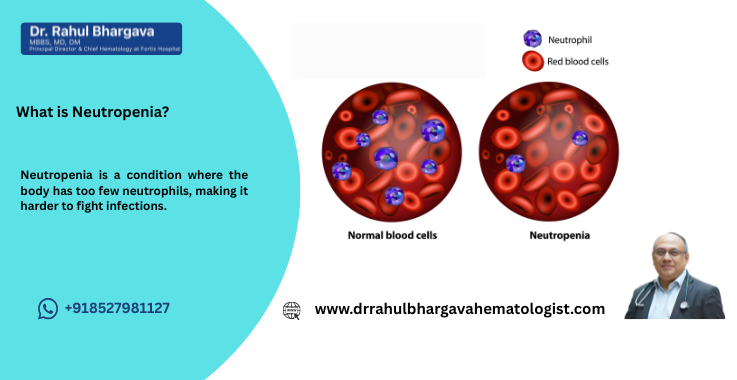Neutropenia Treatment in India

Neutropenia is a condition characterized by an abnormally low neutrophil count in the blood. Neutrophils are a type of white blood cell (WBC) that plays a crucial role in the body's immune defense by fighting infections, particularly bacterial and fungal infections. A normal neutrophil count typically ranges from 1,500 to 8,000 neutrophils per microliter of blood, but in neutropenia, the neutrophil count falls below 1,500 cells per microliter.
Neutropenia can make an individual more susceptible to infections, particularly those caused by bacteria and fungi, as neutrophils are among the first responders to such pathogens. Depending on the severity, neutropenia can be categorized as mild, moderate, or severe. Severe neutropenia, defined by neutrophil counts under 500 cells per microliter, is a medical emergency, requiring immediate attention.
What is Neutropenia?
Neutropenia occurs when your blood has fewer neutrophils than needed to maintain a healthy immune system. Neutrophils are one of the first lines of defense against infections. This condition can be acute (short-term) or chronic (long-term) and can affect both children and adults.
Causes of Neutropenia
There are various factors that can cause neutropenia, including:
- Chemotherapy and Radiation Therapy: Cancer treatments can reduce neutrophil production.
- Autoimmune Disorders: Conditions like lupus or rheumatoid arthritis can lead to the body attacking its own neutrophils.
- Infections: Severe viral infections such as HIV or hepatitis can decrease neutrophil counts.
- Bone Marrow Disorders: Diseases affecting bone marrow, such as leukemia or aplastic anemia, can impair neutrophil production.
- Medications: Certain medications, including antibiotics, can cause neutropenia as a side effect.
- Congenital Disorders: Genetic conditions like severe congenital neutropenia affect neutrophil production from birth.
Types of Neutropenia
There are different forms of neutropenia, including:
- Congenital Neutropenia: A genetic condition that leads to a lifelong deficiency of neutrophils.
- Cyclic Neutropenia: Neutrophil levels fluctuate in a cycle, typically every 21 days, leaving periods of low immunity.
- Autoimmune Neutropenia: The immune system mistakenly attacks neutrophils.
- Febrile Neutropenia: Neutropenia accompanied by fever, usually after chemotherapy.
Symptoms of Neutropenia
Neutropenia itself may not have noticeable symptoms but leaves individuals highly vulnerable to infections. Some common signs to watch for include:
- Frequent infections
- Fever
- Fatigue and weakness
- Mouth ulcers or gum disease
- Skin infections
- Chronic sore throat
- Diarrhea or digestive issues
Diagnosis of Neutropenia
Diagnosing neutropenia requires a comprehensive evaluation. The process may include:
- Blood Tests: A complete blood count (CBC) measures the levels of neutrophils in the bloodstream.
- Bone Marrow Biopsy: A sample from the bone marrow may be examined to assess the production of blood cells.
- Immunological Tests: These tests help determine whether an autoimmune condition is responsible for neutropenia.
- Genetic Testing: In cases of congenital neutropenia, genetic tests may be conducted.
Treatment Options for Neutropenia
The treatment plan for neutropenia depends on its underlying cause and severity. Common treatment options include:
- Medications: Granulocyte colony-stimulating factor (G-CSF) stimulates the production of neutrophils in the bone marrow.
- Antibiotics or Antifungals: Preventive treatment may be necessary to avoid infections during periods of low neutrophil counts.
- Bone Marrow Transplantation: In severe cases, such as congenital neutropenia or bone marrow failure, a stem cell or bone marrow transplant may be recommended.
- Lifestyle Modifications: Patients may be advised to avoid potential sources of infection, maintain good hygiene, and take supplements to support their immune system.
Cost of Treatment and Stay in India
The cost of neutropenia treatment in India is significantly more affordable compared to many Western countries while maintaining high standards of medical care. The exact cost depends on the severity of the condition, the chosen treatment method, and the healthcare facility. Below is an overview of typical expenses:
-
Initial Consultation:
USD: $30 – $100
INR: ₹2,200 – ₹7,400 -
Diagnostic Tests (CBC, Bone Marrow Biopsy, Genetic Testing, etc.):
USD: $50 – $200
INR: ₹3,700 – ₹14,800 -
Medications (G-CSF Therapy):
USD: $200 – $1,000 per dose
INR: ₹15,000 – ₹75,000 per dose -
Antibiotics or Antifungal Treatment (if required):
USD: $100 – $500 per course
INR: ₹7,400 – ₹37,000 per course -
Bone Marrow Transplantation:
USD: $12,000 – $24,000
INR: ₹10,00,000 – ₹20,00,000 -
Hospital Stay (per night):
USD: $25 – $200
INR: ₹2,000 – ₹15,000
India offers state-of-the-art healthcare facilities and experienced specialists, making it a preferred destination for neutropenia treatment. The costs are much lower compared to Western countries, ensuring accessibility to high-quality care without excessive financial burden.
Frequently Asked Questions
Untreated neutropenia can lead to frequent and severe infections, which may become life-threatening if not addressed promptly.
The possibility of a cure depends on the underlying cause. Some cases of neutropenia, such as those caused by medications, may resolve once the drug is discontinued. Others, like congenital neutropenia, may require ongoing treatment or a bone marrow transplant.
Chemotherapy-induced neutropenia can be managed with G-CSF injections to stimulate neutrophil production, along with close monitoring of blood counts and preventive antibiotics
Yes, neutropenia can affect children, particularly in cases of congenital neutropenia or after viral infections.